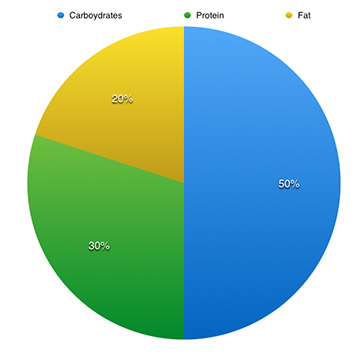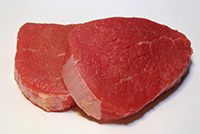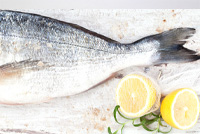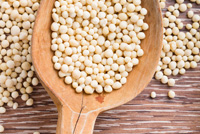How to Gain Weight Naturally, A Complete Guide
While most of the discussion centred around body weight focus on the obesity epidemic, there is a percentage of us who are underweight and would like to learn how to gain weight naturally. The numbers are hardly comparable, for example, it’s estimated 68.8 percent of Americans are considered overweight . On the other hand, only 2 percent are considered underweight. But that small percentage represents almost 6 million people. To put things into perspective, this is roughly the population of Denmark.
A Natural Approach to Weight Gain
It’s not just those who are considered underweight that are interested in gaining weight. There are also those who would like to get bigger to increase strength and athletic performance or may have suffered illness and lost weight as a result.
Just like weight loss, the process for weight gain is pretty simple:
Consume more calories than your body uses = weight gain
But, there’s a natural and healthy way to go about it and an unhealthy way, the purpose of this article is to help you gain weight the natural way and not increase your risk of negative health repercussions.
There are two major areas one should address. They are Nutrition and Weight Training.
Other considerations including sleep, water consumption, and stress also play a role but for the most part, you are going to need to focus on feeding your body with the right nutrients and stimulating growth through weight training.
In the following article, we are going to take a look at nutrition for weight gain and assume you are already doing some form of weight training.
Why Try to Gain Weight?

So why would anyone want to gain weight? After all, we are in the middle of an obesity epidemic . Does it matter if you are underweight?
While there are plenty of reasons to avoid being overweight. For example reducing your risk of Diabetes and Heart Disease. Being a healthy weight will also improve your quality of life. It’s also a fact that being underweight can be just as damaging to your health .
For example adding healthy weight to your frame will reduce your risk of Osteoporosis . If you are underweight, you also run the risk of developing a weakened immune system . It’s also true that those who are underweight have a higher rate of infertility . In children, being underweight can affect development .
What is the definition of being underweight?
Generally speaking those with a body mass index (BMI) of less than 18.5 are underweight. You can check you BMI here: http://www.choosemyplate.gov/supertracker-tools/resources/bmi-calculator.html
Why are you underweight?
It’s not difficult to see why 69 percent of us are overweight e.g. poor diet and low activity levels. We can also blame genetics to some extent.
Being underweight is not all that different. For instance, your genetics can play a role along with your activity levels. Especially when combined with a diet that doesn’t contain enough calories.
Gaining or losing weight isn’t all the complicated despite what you may have heard. Like many things you can make the process as complicated as you like. You are best off understanding the principles involved. You can then shift your focus to what’s required. Then rinse and repeat.
In other words, keep it basic and sustainable. Just like weight loss, there is no silver bullet, so I don’t recommend you go looking for one. Instead, focus on the work required and you will gain weight. It’s impossible not to when following the right course of action.
Gaining the Right Kind of Weight

Many people who gain weight also unknowingly increase their risk of Diabetes, Heart disease and other preventable illnesses.
In much the same way that nutrition plays a significant role in weight loss , it also plays a large role in weight gain. Many people who gain weight (On purpose or otherwise) increase their risk of Diabetes. They also increase the risk of Heart disease and other preventable illnesses. In most cases this is because they have an unhealthy diet. It’s a case of taking one step forward and two steps back when it comes to health.
It’s important to note eating is your number one tool for naturally gaining weight. But it’s of equal importance that the weight you put on is a healthy weight. As opposed to just adding unhealthy body fat. An important factor to keep in mind is your body will only be capable of gaining a specific amount of muscle. Whereas your bodies capacity for adding body fat is almost unlimited.
Macronutrient Ratios
Getting the correct balance of macronutrients is essential for weight gain. There are three major macronutrients our bodies utilise; these are Protein, Carbohydrates and Fat. By changing the ratio of macronutrients you consume, you will see different results. When it comes to gaining weight start with a diet that consists of approximately:

Use this as a starting point and then track your progress and adjust as required. Surprisingly this is also the macronutrient ratio I would recommend for torching body fat and building muscle .
To naturally gain weight, we need to stimulate muscle growth through exercise. We then must feed our muscles with the correct amount of macronutrients. To do this requires a diet high in protein and to most people’s surprise a moderate percentage of fat.
Our body needs fat to survive. In fact, your body requires at least 15% of your daily intake to consist of fat to develop muscle. Because a diet low in fat can reduce hormone levels needed for developing muscle. A diet low in fat can also increase your risk of some cancers.
Fat and protein go together, in much the same way that lean protein in an egg surrounds the fatty yolk.
How Much Protein Should I Consume?
There is some debate depending on who you ask, about just how much protein you need. Bodybuilders subscribe to the theory of 1 gramme of protein for every pound of weight. Others place this number at .85.
The truth is we all respond to attempts to gain weight in different ways. Genetics play a role, your metabolism and how much training you are doing are also important.
In most cases a good starting point is between .85 and 1 gram of protein per pound of body mass. But much like the macronutrient ratio above it’s best to track your progress. You can then make adjustments based on how your body is responding.
*It’s important to note that for some this amount of protein may be unhealthy. For those with a liver disease , we recommend you consult your doctor before making dramatic changes to your diet.
Don’t get the idea that consuming 1 gramme of protein per pound of body mass is easy, for many it’s not going to be. To get a better idea let’s take a closer look at just how much food that is.
We’ll take the average American’s weight as a starting point. Suppose you are 195 pounds (definitely not underweight!) and want to add mass to your frame. You are going to need to consume 195 grams of protein per day. When you consider, there is approx. 31g of protein in 100g of chicken breast you would need to consume over 600g of chicken breast per day.
Luckily you don’t need to eat that much chicken. In fact, you should vary your diet by including some high protein foods. These include eggs (6 grams of protein per egg). Oats (17g of protein per 100g). Vegetables such as kale (4.3g protein per 100g). Sprouted beans (14.1g of protein per 100g). Fish such as salmon (20g protein per 100g) are also an excellent source of protein. If you are vegetarian, many foods contain moderate to high levels of protein. We have listed some of these further below.
Too Much Protein
What happens if you consume too much protein?
Your body can’t utilise endless amounts of protein. In fact, too much protein can be detrimental for your liver. Especially if you have a pre-existing condition. As it will have a difficult time breaking excess amounts of protein down . For this reason, it’s advised if consuming extra protein to increase your water intake.
There is no advantage to consuming more protein than your body needs. In fact, additional protein is often used for energy or stored by the body as fat.
Complete and incomplete proteins
Every wondered what the term ‘incomplete protein’ means? The body utilises 18 amino acids to build muscle. Half of these get produced by our bodies while the other nine must come from food. The nine that come from food are essential amino acids.
Meat products can provide these nine amino acids. While most plant-based protein sources, don’t contain all nine amino acids. They are incomplete protein sources with Soy being the exception to the rule.
For vegetarians looking to increase protein consumption, it’s recommended to combine plant-based foods. Doing so allows you get the entire spectrum.
For examples of combining incomplete protein sources read here: http://nutrition.about.com/od/askyournutritionist/f/protein_combo.htm
What about Carbs?
We’ll take a closer look at Carbohydrates in more detail in a later article. But for now, I recommend you take the ‘zero carbs’ talk that’s becoming increasingly popular with a grain of salt. Super Low carb eating (in my opinion) is a reaction to high-carb/low-fat diets. These diets were popular for many years and during this period, the population became more and more obese. Correlation doesn’t mean causation, however, so blaming these diets for the obesity epidemic is looking at things too simplistically.
If taking a low carb approach to weight gain, you also need to consider what you are substituting. If reducing your carb intake for meat and dairy, you will increase your Cholesterol. Which in turn increases your risk of heart disease.
If you are trying to gain or, lose weight. I don’t recommend zero carbs. Carbs give you the energy you are going to need to stimulate muscle growth in the gym. Instead, focus on increasing your protein intake. You should also focus on weight training and keep your carbs at approx. 20% of your total intake at least.
At worst a zero carb diet is dangerous. Despite the recommendations from some ‘experts’ that low-carb diets are good for cardiovascular health. Studies do show an increase in mortality rates among those with low-carb, high-fat diets.
High Calorie Foods to Gain Weight
Now that we have covered macros let’s take a look at some examples of high calorie, high protein foods. These are the foods you should often be consuming if you want to add weight to your frame the natural way.
Meat Products

Meat products such as lean beef and chicken breast contain high amounts of protein. These protein sources and will help you gain weight. Be aware that meat products also have some negative aspects to them in the form of saturated fats . Which increase your risk of Heart Disease and Diabetes more than plant-based food.
Lean Beef (per 100g)
- 250 calories
- 26g Protein
- 16g fat
- 0g carbohydrate
Chicken Breast (per 100g)
- 165 calories
- 31g Protein
- 3.6g fat
- 4g carbohydrate
Turkey (per 100g)
- 104 calories
- 17g Protein
- 2g fat
- 0g carbohydrate
Pork (per 100g)
- 145 calories
- 21g Protein
- 6 g fat
- 1.5g carbohydrate
Seafood
Seafood is an excellent source of Protein. It is also high in Omega 3 polyunsaturated fatty acids which help promote muscle growth .

Salmon (per 100g)
- 208 calories
- 20g Protein
- 13g fat
- 0g Carbohydrate
Tuna (per 100g)
- 184 calories
- 30g Protein
- 6g fat
- 0g Carbohydrate
Sword Fish (per 100g)
- 172 calories
- 23g Protein
- 8g fat
- 0g Carbohydrate
Snapper (per 100g)
- 100 calories
- 20.5 g Protein
- 1.3g fat
- 0g Carbohydrate
Sardines (per 100g)
- 208 calories
- 25 g Protein
- 11g fat
- 0g Carbohydrate
Dairy Products
High in protein and calcium (helps increase bone density) dairy products are another option. Dairy products are high in saturated fats. So make dairy just one aspect of your daily nutritional needs.

Eggs (per 100g)
- 156 calories
- 6g per egg or 13g per 100g
- 11g fat
- 1.1g Carbohydrate
Milk (per 100g)
- 42 calories
- 3.4g per 100g
- 1g fat
- 5g Carbohydrate
Cottage Cheese (per 100g)
- 98 calories
- 11g per 100g
- 4.3g fat
- 3.4g Carbohydrate
Greek Yoghurt (per 100g)
- 59 calories
- 10g per 100g
- .4g fat
- 3.6g Carbohydrate
Parmesan Cheese (per 100g)
- 431 calories
- 38g per 100g
- 29g fat
- 4.1g Carbohydrate
Vegetables, Beans and Legumes
Despite what many people think, most vegetables do have protein. They are however incomplete protein sources. These are best combined with other protein sources if weight gain is your goal.

Soybeans (per 100g)
- 446 calories
- 36g per 100g
- 20g fat
- 30g Carbohydrate
Lentils (per 100g)
- 1166 calories
- 9g per 100g
- .4g fat
- 20g Carbohydrate
Corn (per 100g)
- 365 calories
- 9g per 100g
- 4.7g fat
- 74g Carbohydrate
Lima Beans (per 100g)
- 115 calories
- 8g per 100g
- .4g fat
- 21g Carbohydrate
Hummus (per 100g)
- 166 calories
- 8g per 100g
- 10g fat
- 14g Carbohydrate
Grains
 Grains are an excellent source of protein, especially for vegetarians. They are also high in amino acids which are the building blocks of protein.
Grains are an excellent source of protein, especially for vegetarians. They are also high in amino acids which are the building blocks of protein.
*please note Oat bran is not technically considered a whole grain.
Oats (per 100g)
- 389 calories
- 17g per 100g
- 7g fat
- 66g Carbohydrate
Spelt (per 100g)
- 338 calories
- 15g per 100g
- 2.4g fat
- 70g Carbohydrate
Buckwheat (per 100g)
- 343 calories
- 13g per 100g
- 3.4g fat
- 72g Carbohydrate
Quinoa (per 100g)
- 368 calories
- 9g per 100g
- 6g fat
- 64g Carbohydrate
Brown Rice (per 100g)
- 111 calories
- 2.6g per 100g
- .9g fat
- 23g Carbohydrate
Nuts and Seeds
 Nuts and seeds are calorically dense. They are also high in protein and fat making them ideal for weight gain.
Nuts and seeds are calorically dense. They are also high in protein and fat making them ideal for weight gain.
Peanuts (per 100g)
- 567 calories
- 26g per 100g
- 49g fat
- 16g Carbohydrate
Almonds (per 100g)
- 576 calories
- 21g per 100g
- 49g fat
- 22g Carbohydrate
Pumpkin Seeds (per 100g)
- 446 calories
- 19g per 100g
- 19g fat
- 54g Carbohydrate
Flaxseeds (per 100g)
- 534 calories
- 18g per 100g
- 42g fat
- 29g Carbohydrate
Walnuts (per 100g)
- 654 calories
- 15g per 100g
- 65g fat
- 14g Carbohydrate
Meal Timing
The list above contains foods high in calories and protein foods that will help you gain weight. But what about how often you should be eating?
There are plenty of people who will state that eating 5-6 smaller meals a day is best when it comes to weight gain. The theory is that if eating smaller more regular meals, your body will have a ready supply of Amino acids. The truth is, as long as you fuel your body pre and post workout you don’t need to be too strict on the timing of your meals.
I’ve tested both methods e.g. consuming 5-6 smaller meals per day and consuming three large meals per day. I noticed no difference when it came to weight gain. In my experience, consuming many smaller meals throughout the day is easier if you are not a big eater. Although there is a convenience factor to take into account. Preparing and consuming many smaller meals does take quite a bit of organising. Especially if doing this for an extended period.
Quick Weight Gain Tips
In the section below are some basic tips that will help you maximise your weight gain efforts. The most important thing to remember is nutrition is at least 80% of the game. Focus on eating well and staying healthy and your body will be at it’s most efficient for weight gain.
Don’t weigh food uncooked
Think you are consuming 250 grammes of chicken breast because you got that much from the grocer? Think again. By the time you have trimmed excess fat and cooked the chicken breast the weight will have reduced a lot. I’ve often seen 1000g of Chicken breast reduced to less than 700 grams once cooked.
Don’t follow the ‘see food’ diet
It might seem natural to eat everything in sight when trying to gain weight. But disregarding proper nutrition is a recipe for disaster. Excess body fat won’t make you healthier, and makes your body less functional.
Add calorically dense nuts and grains to breakfast cereals
You can increase your calories by adding extra foods such as almonds, and walnuts to meals. Your breakfast cereal is ideal for this, try it.
Measure your intake
I’m not a fan of tracking things to the point of obsession. But measuring your protein intake each day will allow you to know what’s required to fuel your body.
Don’t focus on isolation exercises in the gym
If you want to gain weight in the gym, concentrate on the larger compound movements. Do this instead of isolation movements such standing bicep curls and using the cable crossover machine. You should be squatting, deadlifting and hitting the bench press with real intensity.
Lift Heavy
We all enjoy the pump we feel when working out in the gym but there, are two ways to build muscle. ‘The pump’ is the feeling of blood flowing into the area of your body you are working out. For some, this can be easier to achieve by performing a higher rep count. Lifting heavy with low reputations will break down the muscle forcing it to rebuild. Which in turn forces it to grow to adjust to the increasing demand asked of it. Both methods can work, but one will be more efficient than another for most people. Find what works best for you. In most cases lifting, heavier will allow faster results.
Get plenty of sleep
Contrary to popular belief your body doesn’t grow while doing your workout; it grows away from the gym. Getting the most amount of sleep you can help you feel fresher in the gym and your body will recover faster.
Eat later in the evening
I’ve found adding a final meal at around 10:30-11:00 at night has helped me increase my weight over time. Considering your body goes for an extended period at night (up to 8 hours) without any nutrition. Fitting in a final meal late at night can help your body avoid depletion.
Add intensity to your workouts
If you are taking the time to exercise, you may as well maximise your efforts while doing so. It shouldn’t mean you need to increase the amount of time you are in the gym, at all. In fact, a high-intensity workout takes as little as 45 minutes if you push yourself. Avoid long breaks between sets and other distractions such as your mobile phone.
Snack regularly
It’s often beneficial to carry high-calorie snacks with you throughout your day. You can include dairy products, nuts and protein bars to maximise your efforts.
Keep your diet balanced
Protein is essential for muscle growth. But you should ensure your body is receiving adequate carbohydrates and fats also. As this will help create the ideal conditions for weight gain.
Measure your results
It’s just a fact that some of us gain weight faster than others. Make sure you weigh yourself weekly, measure your results and adjust as required. In some cases, you may feel you are eating plenty, but the scales are showing that you need to be eating more.
Be patient
You’re not going to turn into a behemoth overnight, the name of the game is slow and steady. Be patient and stay committed to your goal and you will see results.
Summing things up
The information above should be useful to anyone wanting to gain weight naturally. Remember don’t get too caught up in the details, though. It’s the actions you take that are going to be most important. There are plenty of people who know lots about nutrition that do not get results. There are also plenty of individuals who get results but have a limited knowledge of nutrition. The magic is in the doing!
Natural weight gain is simple enough. Following the recommendations above anyone can put on a few healthy pounds of weight. The trick is to do so without increasing body fat percentages to unhealthy ranges.
